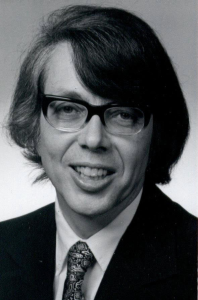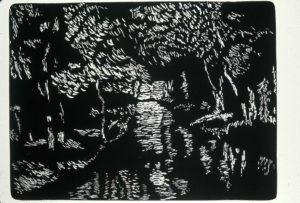
Paul Petrie (1928-2012) was born in Detroit, Michigan in an area which, at that time, was on the outskirts of the city. After receiving a BA (1950) and MA (1951) from Wayne University, he spent two years in the Army during the Korean War, the latter part in Alaska supposedly working in intelligence.
Back home, he went with Philip Levine to study with Robert Lowell, and then successively, John Berryman and Paul Engle at the Iowa Writers Workshop. There he met the artist, Sylvia Spencer, whom he married for her many wonderful qualities, but also for her prints and paintings, thus establishing a symbiotic relationship which has since yielded many poems inspired by prints and many prints inspired by poems. They have three children and five grandchildren (inspired by the usual incentives). He has published eleven collections of poetry, won numerous awards, and was professor emeritus of English and creative writing at the University of Rhode Island, where he taught for over thirty years. His Collected Poems was released by Antrim House in 2014 to critical acclaim. Paul Petrie’s work was featured at this year’s Ocean State Summer Writing Conference’s 10th Anniversary Legacy Tribute: Inspired Pedagogy, Literary Influence, and the Writing Life, which celebrated the life and work of four distinguished emeritus teacher-writers from the University of Rhode Island.
Evolution or Creationism
Blame it on the apes,
or Creation’s trembling
hand,
but here we are–
unfinished people
with faulty brains–
which can think only
in opposites.
Either the canyon’s walls
blind-dazzle with sun,
or loom up, nightmare shapes
against the stars–
all in between–
lost.
Inconceivably, complexly
various
the flickerings of truth.
Shadings, you ever-shifting shadows
of grey,
how can I praise you
enough?
Give us a thousand years,
or a wiser God–
or better still
give us something in-between,
neither this, nor that.

Monotype 18 x 24″
Footprints
I am walking backwards–
carefully–
fitting the shoes of my feet
in my own footprints.
What can I gain
by going where I’ve already been?
Though ahead, just a little ways,
the road ends.
And yet with each backward step
I find new vistas, enchanted
landscapes
I failed to see,
obsessed by motion’s dream.
There they are–
green sunlit fields,
white rivers
of leaping fish,
round hills
that fold themselves like lovers
around other hills–
I stand on each spot, transfixed,
and gaze.
I could walk backwards
forever–
but the road
is following me,
and the road
ends.
But I do not seem to care
as I once cared
where the road goes.
I have been where I have been,
seen what I have seen,
and footprints mark the way–
and will, for a time,
remain.
Nancy Potter, acclaimed short story writer, winner of a PEN/NEA Fiction Award, and University of Rhode Island professor and administrator from 1947-1989, talks about Paul Petrie’s impact:
“Paul Petrie was responsible for gently gathering about a dozen
of his colleagues who had been suspected of writing prose and
poetry on their own time, and he was, indeed, responsible for
cultivating a loose and civil structure that promised a decade or
so of fine group behavior. That was no small achievement.
We trusted him, and I think that he accepted that trust
without fuss. After all, he was, by then, a seasoned apprentice
of a poetry group at Wayne State and a recent graduate of the
celebrated Iowa Writers’ Workshop. His admirable example
as mentor and supportive colleague simply produced a lasting
atmosphere of balance and acceptance. We had few absolute
rules. Paul expected us to provide sufficiently in advance
copies of our manuscripts. He also expected that we would
appear with reasonable questions and practical suggestions for
improvement of style. We grew in confidence and gained some
skill in judgement. Over the years Paul remained as a lovely
standard of affectionate civility, balanced with wit and insight.
By some miracle those pleasant Friday evenings in various
Kingston living rooms quite simply turned us into better
writers. It was a comfortable and gracious process, allowing
us to believe that we had years of such association in reserve.
There’s the trick of mortality waiting for everyone. Decades
later, I realize how lucky we were. We were still young enough
and busy with our lives not to have complimented Paul’s
remarkable collection of skills. Of course, we had to recognize
his poetry’s music, his firm control of structure and images.
Most of all, we were proud to share his values and hopes as
writers. We admired his quiet wit, and we carried his remarkable
images of life and behavior into our own memory banks. And,
finally, we knew somehow that other generations would share
such experiences of making essays and poems and stories.”
More poems and information can be found at http://www.paulpetrie.org/. His Collected Poems are available at Amazon.
